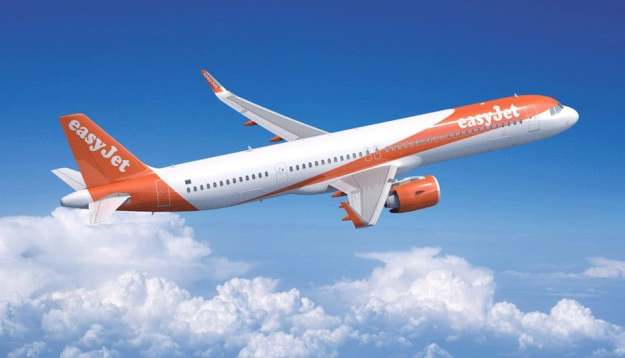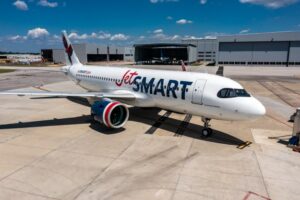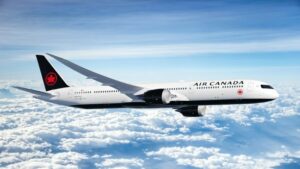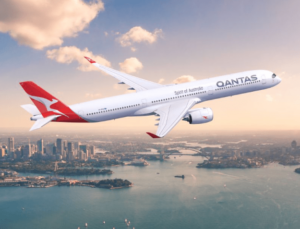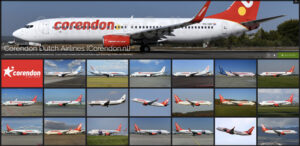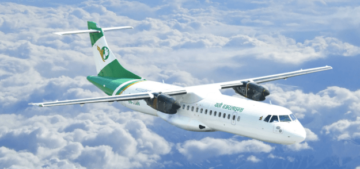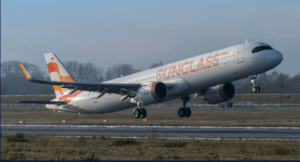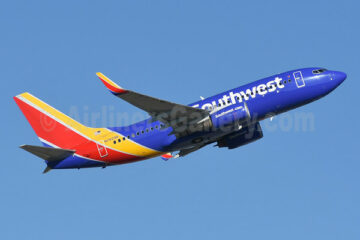easyJet has announced it has reached a deal with Airbus for 157 new Airbus aircraft with this statement:
- Proposed aircraft purchase
o 157 firm orders for delivery between FY29 and FY34 and 100 Purchase Rights, subject to
shareholder approval
o Existing order book of 158 aircraft for delivery by FY29
o Conversion of 35 A320neo deliveries into A321neos within existing order
o 315 aircraft now on order for delivery by FY34 alongside a further 100 purchase rights
Johan Lundgren, CEO of easyJet, said:
“We have delivered a record summer with strong demand for easyJet’s flights and holidays with customers choosing us for our network, value and service.
“This performance has demonstrated that our strategy is achieving results and so today we have set out an ambitious roadmap to serve more customers and deliver attractive shareholder returns, underpinned by a continued focus on costs and operational excellence. Our new medium-term targets provide the building blocks to deliver a PBT greater than £1 billion. This will be driven by reducing winter losses, upgauging our fleet and growing easyJet holidays. As part of our commitment to shareholder returns, the Board intends to reinstate dividends commencing with the FY23 results.
“We have also reached a proposed agreement with Airbus for an additional 157 aircraft order and a further 100 purchase rights. This will enable easyJet’s fleet modernisation and growth to continue beyond 2028 while providing substantial benefits including cost efficiencies and sustainability improvements.”
Proposed aircraft purchase and conversion
easyJet already has 69 A320neo family aircraft within its fleet and an existing order book with Airbus to FY29 for a further 158 A320neo family aircraft still to be delivered. Alongside this, easyJet has now entered into conditional arrangements with Airbus to secure the delivery of a further 157 aircraft (56 A320neo & 101 A321neo) between FY29 – FY34 as well as 100 purchase rights (the “Proposed Purchase”). This provides easyJet with the ability to complete its fleet replacement programme of A319 aircraft and replace approximately half of the A320ceo aircraft, alongside providing the foundation for disciplined growth. The Company is in exclusive negotiations with CFM for the supply of engines for the Proposed Purchase.
easyJet has also agreed to exercise conversion rights within its current order book to convert 35 A320neo deliveries into A321neo aircraft (the “Conversion”). This alongside the Proposed Purchase will deliver lower fuel burn, CO2 emissions and operating costs per seat.
The Board believes the Proposed Purchase and the Conversion is in the interest of easyJet’s shareholders, will support positive returns for the business and is a core part of the delivery of our strategic objectives.
- – Commercial Terms: The financial terms of the agreement reached with Airbus for the Proposed Purchase are attractive. They are the result of a comprehensive, detailed and competitive process which has been run over the course of the last 12 months. This process covered both airframe (Airbus and Boeing) and engine (CFM and Pratt and Whitney) manufacturers. The Board believes the terms secured represent extremely attractive value with improved economics for future deliveries based on the commercial terms and fleet mix.
- – Securing Certainty of Aircraft Supply: The Group’s ability to sustain its route network, maintain desirable airport slots and to grow depends on the timely delivery of aircraft. Delivery slots for narrow body aircraft with circa 200 seats are very limited until at least 2029 from both Airbus and Boeing. easyJet anticipates that this limitation will extend into 2030 and beyond within the next year. By placing an order now, easyJet ensures a supply of future delivery slots between FY29 and FY34 to retain its current scale through replacing aircraft leaving the fleet and this enables easyJet to execute its disciplined growth strategy.
- – Maintaining Operational Scale: A proportion of the new aircraft will be used to replace older aircraft as they reach the end of their useful life at easyJet. These aircraft will become economically unviable for our high intensity low-cost operation and will need to be replaced if we are to maintain the current scale of our business.
- – Enabling Future Growth: The Proposed Purchase and Conversion provides easyJet with the opportunity to grow its capacity through a combination of incremental aircraft and accelerated upgauging. This flexible fleet planning means easyJet will have the opportunity to utilise the firm orders and the extension of leases of aircraft within the existing fleet to increase the size of the airline should market conditions support growth. The 100 purchase rights provide easyJet with an opportunity to further grow depending on when they are delivered.
- – Cost Benefits of New Generation Technology: The new aircraft will continue the modernisation of the easyJet fleet, with the average aircraft age dropping by 1.5 years from 9.9 years in FY23 to 8.4 years in FY33. The new aircraft will deliver between a 13% to 30% unit fuel burn efficiency improvement (depending on which aircraft they replace). The costs of carbon emissions are expected to increase over the coming years, and increased fuel efficiency will lead to a proportional reduction in carbon emissions. Additionally, some airports provide discounted fees for new generation aircraft, further enhancing the economic benefits.
- – Increased Aircraft Size: The Proposed Purchase and Conversion will accelerate the upgauging of the airline, with the airline significantly increasing its proportion of 235 seat A321neo aircraft by FY33 through the 101 firm A321neos in the Proposed Purchase and 35 A320neo to A321neo conversions. This will result in further improvements in cost efficiency, with the fixed costs of each flight spread across a greater number of passengers. These economics see the A321 optimally deployed on a subset of the network where the A321neo’s higher trip costs are more than offset by its ability to capture additional revenue on routes which are typically high demand, slot constrained or longer in sector length. The access to additional A321neo aircraft will also provide easyJet with the opportunity to continue to grow in slot constrained airports.
- – Sustainability Benefits: The new aircraft are aligned with easyJet’s sustainability strategy, with the adoption of the more efficient new technology aircraft being a core component of easyJet’s path to net zero emissions. Alongside this, the new aircraft are significantly quieter, with half the noise footprint of the older aircraft they are replacing.
Based on latest list prices for aircraft published in January 2018, the Proposed Purchase and the Conversion are expected to result in an aggregate commitment of approximately USD19.9 billion, which will be spread over a number of years. The aggregate actual price for the aircraft would be substantially lower because of certain price concessions granted by Airbus.
On the financial side:
easyJet delivers record Q4 PBT, thereby achieving in FY2023 its existing financial targets. Business momentum now allows the setting of new, ambitious, medium-term targets, a proposed new aircraft order and resumption of dividends.
• Record Q4 headline profit before tax expected to be between £650 – £670 million o Passengergrowth+8%YoY
o RPS +9% YoY vs guidance of c. 10%
▪ Ticket yield per passenger +9% YoY
▪ Ancillary yield per passenger +14% YoY
o CPS ex fuel flat YoY
• Record H2 headline profit before tax expected to be between £850 – £870 million
o Passenger growth +7% YoY
o RPS +15% YoY
o CPS ex fuel reduced 1.3% YoY vs guidance of flat
- FY23 headline PBT between £440 – £460 million
o easyJetholidayscontinuestooutperformandisexpectedtodeliveraround£120millionPBTfor FY23 - Q1 FY24 Guidance
o Capacityc.15%aheadYoY
o Yields ahead YoY with load factors broadly in line
o AirlineCPSexfuelexpectedtoslightlyreduceYoY
- New medium-term targets with the ambition to deliver >£1bn PBTo GroupPBT1perseatof£7-10
o HighteenROCE2
o Holidays PBT1 to >£250m
o Capacitygrowthc.5%CAGRto2028
Summary
easyJet expects its FY23 Group headline profit before tax to be between £440 million and £460 million with easyJet holidays contributing around £120 million. Demand for easyJet’s primary airport network has remained strong, delivering a record financial performance for the Group this summer. Moving into the 2024 financial year, booking momentum is continuing and we expect Q1 capacity to grow by c.15%. Ticket yields are ahead year on year with load factors broadly in line. Our continued focus on cost alongside productivity and utilisation gains are expected to result in the Airline cost per seat excluding fuel slightly reducing year on year in the December quarter.
Moving forward, easyJet has today updated its capital allocation framework to underpin the business’s focus on serving customers well whilst delivering attractive shareholder returns. Executing the four pillars of our strategy involves: building Europe’s best network, transforming revenue, delivering ease and reliability and driving our low-cost model alongside capital discipline and disciplined growth. This, supported by easyJet’s strong balance sheet, provides the platform to deliver long term shareholder value with sustainable returns.
New medium-term targets
Having largely achieved easyJet’s current medium term financial targets (mid-teen EBITDAR, easyJet holidays to deliver >£100 million profit before tax and a low to mid teen ROCE), easyJet has today launched new, and ambitious, medium-term targets, providing the building blocks to achieve a Group PBT per seat of between £7 to £10. The levers to achieving this are reducing winter losses, growing easyJet holidays to deliver over £250 million of PBT and the cost savings that our current Airbus order book will deliver from fleet efficiency and upgauging. In addition to the delivery of our strategy, these targets are integral to achieving easyJet’s ambition to deliver more than £1 billion PBT.
- SEO Powered Content & PR Distribution. Get Amplified Today.
- PlatoData.Network Vertical Generative Ai. Empower Yourself. Access Here.
- PlatoAiStream. Web3 Intelligence. Knowledge Amplified. Access Here.
- PlatoESG. Carbon, CleanTech, Energy, Environment, Solar, Waste Management. Access Here.
- PlatoHealth. Biotech and Clinical Trials Intelligence. Access Here.
- Source: https://worldairlinenews.com/2023/10/12/easyjet-to-order-157-additional-airbus-aircraft/
- :has
- :is
- :where
- 1
- 100
- 12
- 12 months
- 15%
- 200
- 2018
- 2024
- 2028
- 2030
- 35%
- 8
- 9
- a
- A320NEO
- A321NEO
- ability
- accelerate
- accelerated
- access
- Achieve
- achieving
- across
- actual
- addition
- Additional
- Additionally
- Adoption
- age
- aggregate
- Agreement
- ahead
- Airbus
- aircraft
- airline
- airport
- Airports
- aligned
- allocation
- allows
- alongside
- already
- also
- ambition
- ambitious
- an
- and
- announced
- anticipates
- approximately
- ARE
- around
- arrangements
- AS
- At
- attractive
- average
- based
- BE
- because
- become
- been
- before
- being
- believes
- benefits
- BEST
- between
- Beyond
- Billion
- Blocks
- board
- body
- Boeing
- book
- booking
- both
- broadly
- Building
- burn
- business
- by
- Capacity
- capital
- capture
- carbon
- carbon emissions
- ceo
- certain
- certainty
- CFM
- choosing
- circa
- co2
- co2 emissions
- combination
- coming
- commencing
- commercial
- commitment
- company
- competitive
- complete
- component
- comprehensive
- concessions
- conditions
- continue
- continued
- continuing
- contributing
- Conversion
- conversions
- convert
- Core
- Cost
- cost savings
- Costs
- course
- covered
- Current
- Customers
- deal
- December
- deliver
- delivered
- Deliveries
- delivering
- delivers
- delivery
- Demand
- demonstrated
- Depending
- depends
- deployed
- detailed
- discipline
- disciplined
- dividends
- driven
- driving
- Dropping
- each
- ease
- Economic
- Economics
- efficiencies
- efficiency
- efficient
- Emissions
- enable
- enables
- end
- Engine
- Engines
- enhancing
- ensures
- entered
- Ether (ETH)
- Europes
- Excellence
- excluding
- Exclusive
- execute
- executing
- Exercise
- existing
- expect
- expected
- expects
- extend
- extension
- extremely
- factors
- family
- Fees
- financial
- financial performance
- Firm
- fixed
- flat
- FLEET
- flexible
- flight
- Flights
- Focus
- Footprint
- For
- Forward
- Foundation
- four
- Framework
- from
- Fuel
- fuel efficiency
- further
- future
- future growth
- Gains
- generation
- granted
- greater
- Group
- Group’s
- Grow
- Growing
- Growth
- guidance
- Half
- Have
- headline
- High
- higher
- holidays
- HTTPS
- if
- improved
- improvement
- improvements
- in
- Increase
- increased
- increasing
- incremental
- integral
- intends
- interest
- into
- involves
- IT
- ITS
- January
- largely
- Last
- latest
- launched
- lead
- least
- leaving
- Length
- Life
- limitation
- Limited
- Line
- List
- load
- Long
- longer
- losses
- Low
- low-cost
- lower
- maintain
- Manufacturers
- Market
- market conditions
- max-width
- means
- medium
- Mid
- million
- mix
- model
- Momentum
- months
- more
- more efficient
- moving
- Need
- negotiations
- network
- New
- next
- Noise
- now
- number
- objectives
- of
- offset
- older
- on
- operating
- operation
- operational
- Opportunity
- or
- order
- orders
- our
- out
- over
- part
- path
- per
- performance
- pillars
- placing
- planning
- platform
- plato
- Plato Data Intelligence
- PlatoData
- positive
- price
- Prices
- primary
- process
- productivity
- Profit
- programme
- proportion
- proposed
- provide
- provides
- providing
- published
- purchase
- Q1
- Quarter
- reach
- reached
- record
- Reduced
- reducing
- reduction
- reliability
- replace
- replaced
- replacement
- represent
- result
- Results
- retain
- returns
- revenue
- rights
- roadmap
- Route
- routes
- rps
- Run
- Said
- Savings
- Scale
- sector
- secure
- Secured
- see
- serve
- service
- serving
- set
- setting
- shareholder
- Shareholders
- sheet
- should
- side
- significantly
- Size
- slot
- slots
- So
- some
- spread
- Statement
- Still
- Strategic
- Strategy
- strong
- subject
- substantial
- substantially
- summer
- supply
- support
- Supported
- Sustainability
- sustainable
- targets
- tax
- Technology
- teen
- term
- terms
- than
- that
- The
- their
- thereby
- These
- they
- this
- Through
- ticket
- timely
- to
- today
- transforming
- trip
- typically
- underpin
- underpinned
- unit
- until
- updated
- us
- used
- utilisation
- value
- very
- vs
- we
- WELL
- when
- which
- while
- Whilst
- will
- Winter
- with
- within
- would
- year
- years
- Yield
- yields
- zephyrnet
- zero

